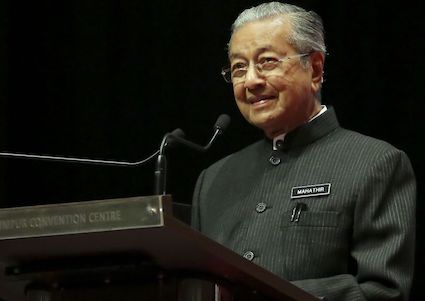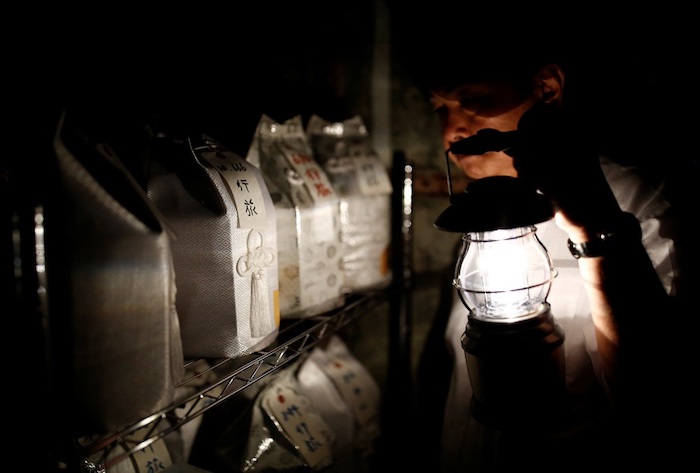Mahathir wants Malaysia to become like Japan

Ageing Japan: Unclaimed burial urns pile up in Japan amid fraying social ties
(Reuters) – Unclaimed urns containing ashes of the dead are piling up by the thousands across Japan, creating storage headaches and reflecting fraying family ties and economic pressures in a rapidly ageing nation.
The identities of the dead, cremated at public expense, are usually known. But in most cases, relatives either refuse or don’t respond to requests to collect their remains. Burials can be costly and time-consuming, a burden on family members who may hardly know the deceased relative.
“When I die, though I have only ¥150,000 yen (RM5,547), will you cremate me and put me in a pauper’s grave? I have no one to collect my remains,” said a note left by a man in his 70s in Yokosuka, south of Tokyo, who died in 2015 and whose urn was later buried at a local temple.
The abandoned remains highlight social, economic and demographic changes in Japan, where more elderly live on welfare and families are more scattered, weakening traditional family bonds and obligations.
It is a problem that is likely to grow, experts say; deaths in Japan are projected to rise from 1.33 million a year to 1.67 million by 2040, even as the overall population drops.
Yokosuka was so overwhelmed with unclaimed urns that it ran out of space in a 300-year-old charnel house that was about to collapse. It combined ashes of different people into a much smaller number of urns that it now stores in a hillside cave, with about 50 newer urns accumulating at the city office.

“Space to store them is running out,” said Hitomi Nakamura, an official in Saitama city, north of Tokyo, where the number of unclaimed urns has grown sharply the last few years to more than 1,700.
“Many elderly people are living on welfare,” he added, “and many of them may be estranged from their families”.
With Japanese wages barely growing, and many children of the elderly living on pensions themselves, managing death costs, including arranging for their burial, can be a burden.
A traditional funeral, including food, drinks and gifts for guests, and hiring a Buddhist monk to chant sutras, can cost ¥2 million or more, industry sources say.
New businesses have sprung up offering no-frills funerals for US$2,000 (RM8,371) to US$4,000, but other costs can add up, including the hundreds of dollars it may cost to bury the urn at a temple or cemetery.
Poor elderly
There are more elderly poor than in years past, some of whom cannot afford their own funerals. Nearly 3 per cent of elderly were on welfare in 2015, almost double the rate two decades earlier, government statistics show. Just over half of all Japanese on welfare are 65 or older.
“There are more people who die alone, with no one to look after cremated remains because of weaker family relationships,” said Hisako Makimura, a visiting professor of sociology at Kansai University.
In decades past, it was not uncommon for three generations of family to live together. But experts say that as Japan’s economy has changed, couples have fewer children, and people tend to move farther from home for work, among other factors.
Nearly 6,000 urns have accumulated in the southern city of Fukuoka, while Osaka, in western Japan, buried the remains of 2,366 people in a communal grave this year after no one claimed them after one or two years.
The number of Japanese age 65 and older will swell from 28 per cent of the population to 36 per cent by 2040, according to the government-backed National Institute of Population and Social Security Research.
“Families and communities used to play roles of taking care of deceased people,” Makimura said. “But the burden on local governments will likely grow as their involvement in dealing with the dead increases.”
‘So relieved’
In Yokosuka, more elderly are dying without leaving funeral instructions or information about relatives.
City officials comb through their homes and census registries, and try to contact family members through the mail, often to no avail.
“The dead are ordinary citizens. It could happen to anyone,” said Kazuyuki Kitami, a city official. “These bones are warning those of us who are alive that we are poorly prepared.”
Noticing that many unclaimed remains were from poor elderly people, Yokosuka in 2015 started an “ending plan support” service for low-income residents with no immediate family members.
Individuals pay at least a fifth of the ¥250,000 cremation and burial costs, with the government covering the rest. Dozens have signed up, and in May the city made similar services available to anyone.
“I feel so relieved,” said Sumitaka Haraguchi, 80, after signing up for the service and ensuring he will be buried at a local temple.
Haraguchi never married and hasn’t seen his three step-siblings in many years, so he worried what would happen to his remains when he died.
“My days have changed,” he said from his nursing home. “I feel calm.”

